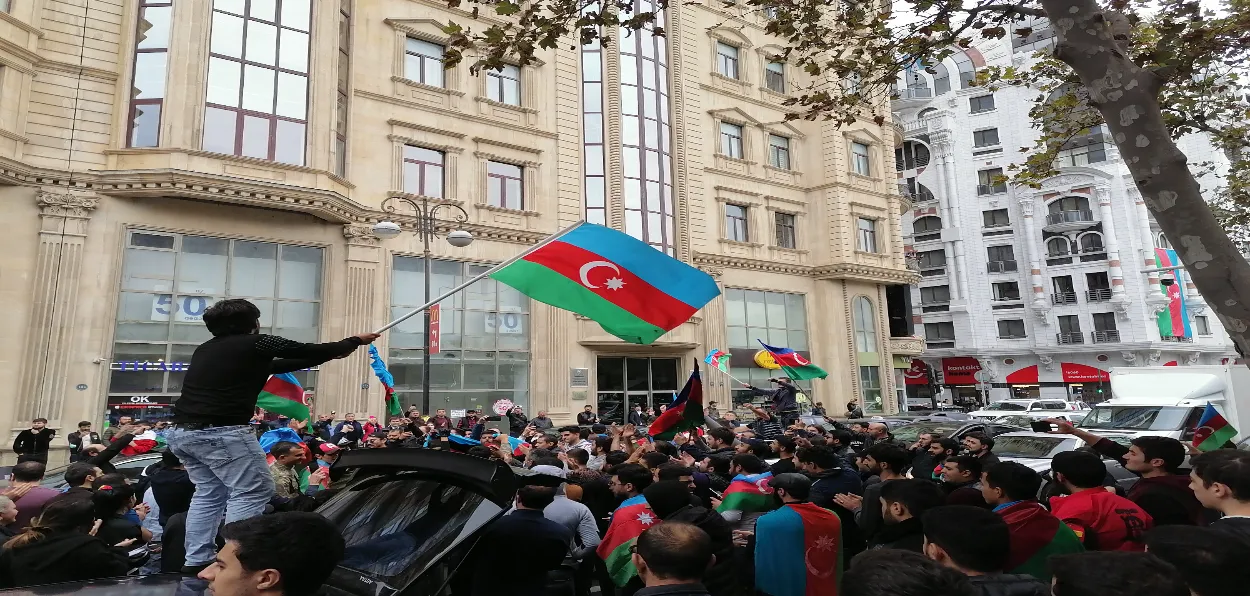
 Aditi Bhaduri
Aditi Bhaduri
On November 12, India shipped the first Akash Air defense system battery to Armenia. The Akash, developed by the Defence Research and Development Organization is a surface-to-air missile (SAM) that can hit targets to a range of 25km. Armenia had placed an order to procure 15 Akash missile systems worth around Rs 6,000 crore in 2022.
Geopolitics
Interestingly, this comes almost on the heels of Armenia's rival Azerbaijan's celebration of the fourth anniversary of their victory on November 8, 2020, ending the war with Armenia over the contested territory of Nagorno-Karabakh. Four years ago, on this day, the Azerbaijani forces retook the capital of Nagorno-Karabakh from the Armenians, the ethnic inhabitants of the region.
The event, not coincidentally, was also well celebrated in Pakistan. Prime Minister's Coordinator on Climate Change Romina Khursheed Alam, Governor of Sindh Kamran Tessori, and Chairman of Higher Education Commission of Pakistan Dr. Mukhtar Ahmed attended the function. Chief Guest of the function in Islamabad Federal Minister for Housing and Works, Mian Riaz Hussain Pirzada spoke about how Pakistan and Azerbaijan are brotherly countries with shared common historical, cultural, and religious bonds.
There is a context to this “begani shadi mein Abdullah diwani” story. It is now confirmed that Pakistani mercenaries participated in the war on the side of Azerbaijan. Since the war, relations between the two countries have warmed up with high-level visits, and joint military exercises. Recently Azerbaijan President Ilham Aliyev visited Pakistan. He was supposed to be to firm up a deal for procuring 8 JF-17C Block-III warplanes. The $1.6 billion deal is Pakistan’s biggest defense order to date. Pakistan will also supply Azerbaijan with ammunition, including air-to-surface missiles. Moreover, Pakistan trains Azeri military personnel.
Akash Air defence System on display at Republic Day Parade
Meanwhile, Armenia has become the largest exporter of Indian defense products. A recent report by the Ministry of Finance stated that Armenia had become the largest importer of weapons from India after deals for the Pinaka multiple-launch rocket system and the Akash anti-aircraft system materialised. The report added “… the total volume of weapons purchases by Armenia from India reached $600 million by the start of the current (financial year) 2024–25.
Armenia has traditionally been a defence ally of Russia, with Russian weapons contributing to more than 90 percent of its arsenal. Armenia is also a member of the Moscow-led military bloc - the Collective Security Treaty Organisation (CSTO). However, during the 2020 war with Azerbaijan, Armenia perceived gaps in Russia's military support for it.
The following year, it again alleged a lack of Russian support when Azerbaijan attacked not the disputed territory of Nagorno-Karabakh, but what is officially Armenian territory. The CSTO didn’t fulfill its obligations to its member states.
Yet, their cooperation began from the time of Azerbaijan's independence in 1991 after the dissolution of the USSR. Turkey played a role in this. While India followed an even-handed policy of recognizing the independence of both South Caucasian nations, Pakistan’s rivalry with India, kept Azerbaijan from developing relations with India. Defence cooperation between the two countries began soon after, and Azerbaijan began reiterating Pakistan position on Kashmir.
Indian embassy in Yerevan's poster of Indian films to be screened in the Armenian capital
India's cooperation with Armenia began on a smooth track but took three decades to pick up and consolidate into close defense cooperation. Yet, India had and continues to maintain a neutral position on Nagorno-Karabakh. While Pakistan actively helped Azerbaijan in the 2020 war, no Indian weapons were used by Armenia.
What is worrisome?
Armenia has supported India on Kashmir, as against Pakistan and Turkey’s vehement anti-India stance. Since the reorganization of the state in 1919, Turkey has annually - save this year - been raising the issue at the UN. Since the 2020 victory Azerbaijan has begun to echo the Pakistan-Turkey position. Not just in defence, Pakistan-Azerbaijan relations are also aimed at connectivity to the warm waters of the Arabian Sea for Azerbaijan. Azerbaijan 's pet project of the Zangezur Corridor envisages an overland transport Corridor via Armenia to Turkey and the Black Sea. But it does not take into consideration Armenian control over the Corridor. Turkey is also interested in the Corridor to access the markets and resources of Central Asia.
Any erosion of Armenia's sovereignty is detrimental to India and its connectivity plans. For India, the shortest land route to the Black Sea and Europe is via Armenia. That is why, India spoke up when the sovereign territory of Armenia came under attack by Azerbaijan in 2022. India’s then permanent representative to the UN Ruchira Kamboj called out the "aggressor" without naming Azarbaijan.
Such actions make the situation in the South Caucuses worrisome. Azerbaijan's President Aliyev has several times warned Armenia of arming itself with new weapons. This, coming even as Azerbaijan itself buys weapons and acquires training from Pakistan, is mildly put, bizarre.
Even though relinquishing Nagorno-Karabakh came at a high material and emotional cost to Armenia, with thousands of refugees from the territory pouring into the country, Armenia has no will to go to war over it.
ALSO READ: Why Pasmanda Muslims are speaking up against Maulana Azad
Azerbaijan's aggression against the sovereign territory of Armenia, however, has the potential to change the equation. This is better preempted.
